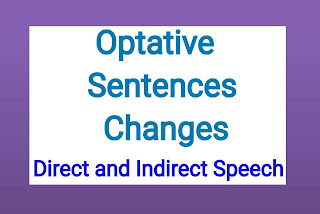LESSON PLAN OF CONVERSION OF DIRECT INTERROGATIVE SENTENCES INTO INDIRECT SPEECH

LESSON NO. 36- CONVERSION OF DIRECT INTERROGATIVE SENTENCES INTO INDIRECT SPEECH Subject English Grade 10 th Rules of change: (i) If the direct speech is in interrogative sentence, Reporting Verbs such as say, tell etc. are changed into ask, esquire, want to know etc. in the indirect speech and the verb takes an object. (ii) If the reported speech beginning with helping verb(is, am, are, was , were, do, does, did, has, have, had, will, would, can, could, shall, should, may, might, must) remove the inverted commas and use ‘if’ or ‘whether’ “that” is not used to join the reporting verb and reported speech. (iii) If the direct speech begins with some ‘Wh’ question word, such as who, what, where, why, how, etc. these are retained in the indirect speech. (iv) Helping ve...



